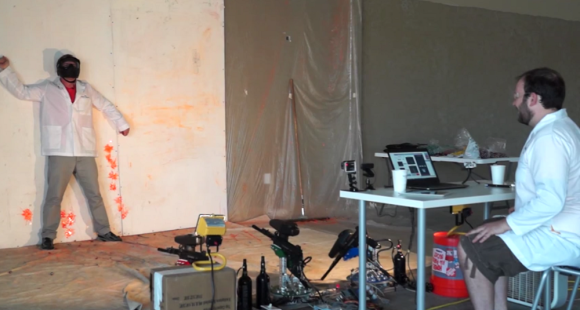
We’ve seen quite a few automated paintball marker systems over the years. Generally it’s the same story – a motion detection system used to target and fire upon the opposing team, prowlers, spouses, etc. [Waterloo Labs] decided to take a slightly different approach, and create a system that intentionally misses its target. Paintball Picasso uses a pair of Tippmann A-5 paintball markers to draw an outline around the person in its sights. This is a rather safe project for [Waterloo Labs], considering their previous adventures in car surfing.
The Paintball Picasso system uses a webcam to capture an image of a willing test subject. Picasso then processes the image. The human outline is plotted on a 50×50 grid of paintball pixels. Then the real fun begins. Paintball Picasso uses a National Instruments myRIO to command two paintball markers to simultaneously fire. The markers are fitted with high torque R/C style servos for pan and tilt. At 10 rounds per second the markers quickly draw the human outline. The test subject walks away slightly splattered, but otherwise unscathed. With a matrix of 2500 points, [Waterloo Labs] has enough resolution to draw some basic logos.
We liked the mounting system [Waterloo Labs] created for the markers. Using a mix of 3D printed parts, Lego Tetrix, 80/20 aluminum extrusion, and ball bearings, they fashioned a mount that moved smoothly enough for R/C servos to actuate, yet was strong enough to withstand the kick of firing. We’d love to see the servos swapped for stepper motors and belt drives. While open loop, stepper motors would afford more accuracy and a longer life than PWM driven R/C servos.














Why not stepper motors, belt-drive, and some kind of feedback system (oh, perhaps some high-resolution servo potentiometers, or maybe an absolute digital encoder) – and have all the advantages of a high-accuracy drive with closed-loop design? Just because “everybody” seems to use servos open-loop doesn’t mean it -has- to be done that way.
Agreed. Closed loop servos with encoders are high torque, high speed, high accuracy.
Cost
yup, costly (I also posted this below but it deserves a spot in this thread) http://www.circuitspecialists.com/closed-loop-stepper-motor-systems
crOsh – closed loop industrial servos would be the most accurate option – but those get expensive. I suggested open loop steppers because the system is relatively static in required torque – i.e. the gun weight doesn’t change. If the stepper accelerations are calculated conservatively, they won’t have to worry about dropped steps very much, This would allow them to run the usual “zero limit then open loop” setup seen with steppers. If they have money for steppers and encoders, there’s no reason not to do that. Pretty much anything would beat R/C servos in this application.
I’d wear more than a paint ball helmet, I’d wear a baseball cup as well, Just In Case…
I’d rather put on some 3mm steel pants on first, before standing there. Bet they cut out the part where the paintball hits the balls.
I know of a way how to make the model make a bow after the performance…
To write the software entirely in labview is the dumbest idea ever. They must have had an employees forum ni write it for them else it would have taken 100 years. Worst language ever. Their hardware isn’t bad, and you can drive it with matlab
I think you missed the part where Waterloo Labs is a group of makers that work at NI. Why else would they be using expensive controllers when they could do similar things with less expensive hardware. :-) Not dogging the hardware they’re using, just noting the only hacker projects I’ve seen using it are made by NI employees with access to said hardware.
You CAN actually get closed-loop steppers… but… the price is… well see for yourself. http://www.circuitspecialists.com/closed-loop-stepper-motor-systems
Or make your own closed loop steppers by putting encoders onto dual shaft steppers.
I’d wear a paintball clothes, paintball pant, gloves, helmet for protections, I’d wear a paintball tournamint cup as well, Just In Case
I thought the servos were too “jittery” – It doe not look neat enough when the guns flap about like that (and my code would include a triple-nutshot every once in a while for the added YouToob Appeal).
It’s like the Storm Trooper of paint ball bots :P
I did not quite understand the reason why they are developing this system and what is its main purpose. But no doubt they have been making great inventions. This product is using very costly mechanism. They could have made it cheaper. I want to know more about this project. What will be the effect if the person is moving constantly at a very fast pace?